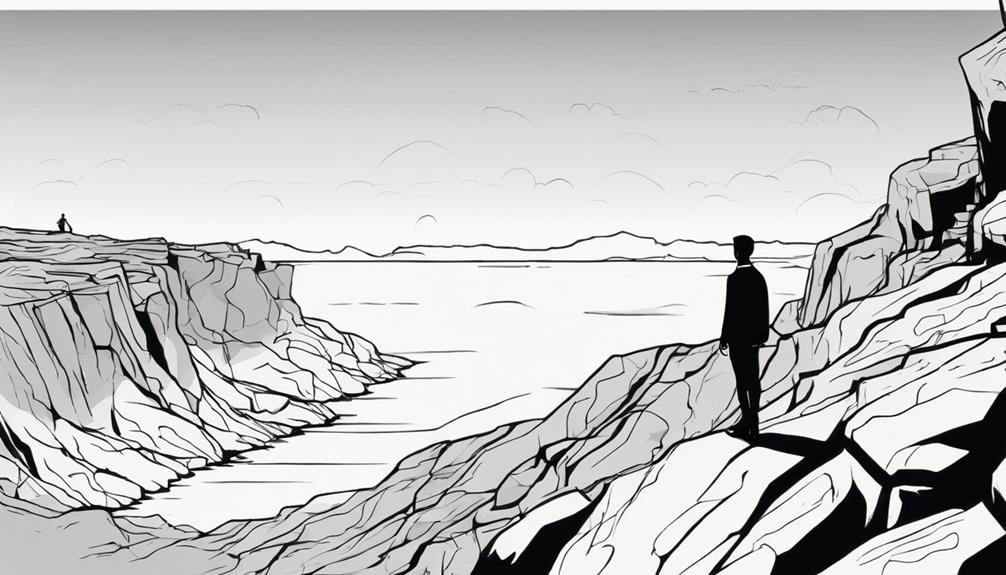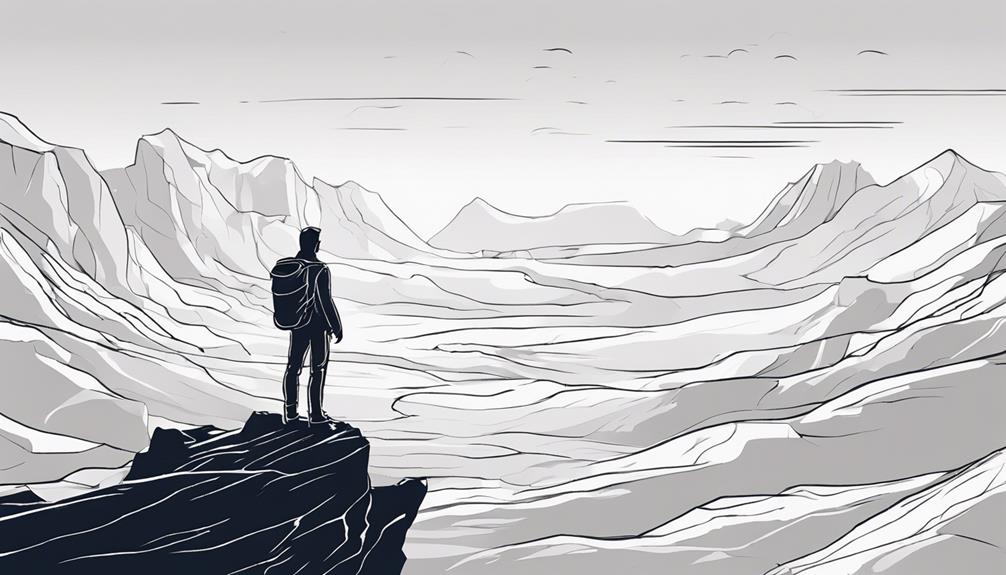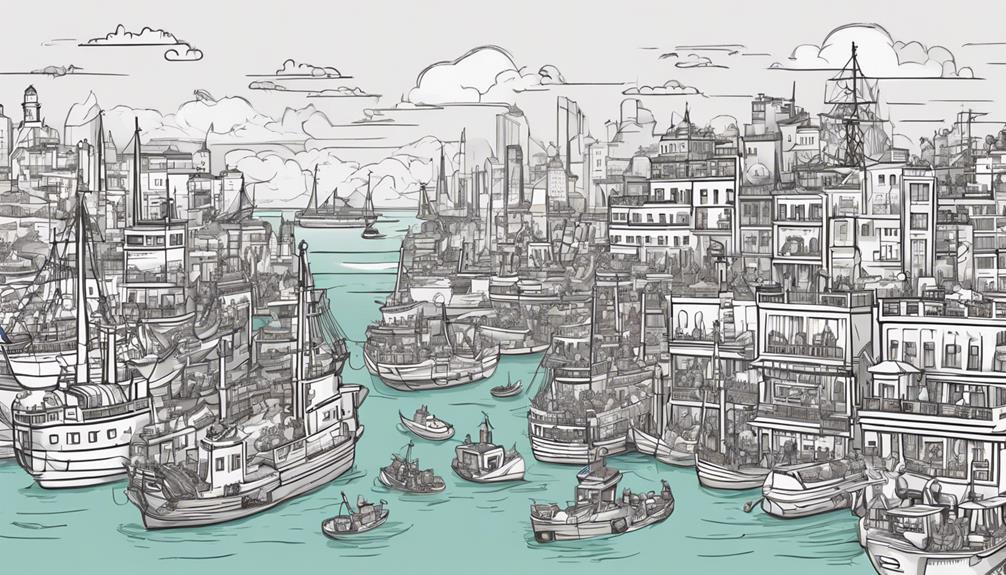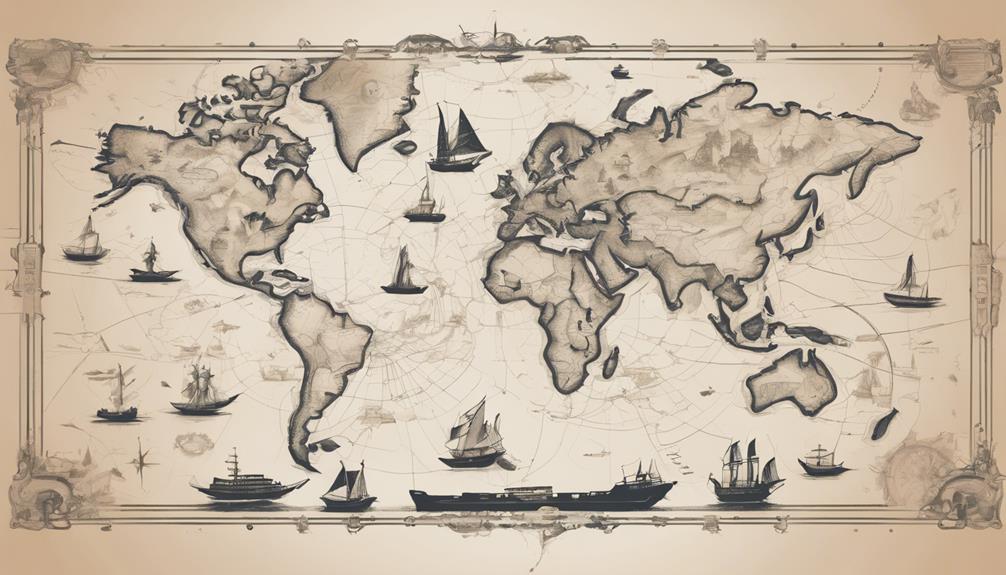The human drive to explore and discover is a complex interplay of innate motivations and external factors that have shaped our history and continue to influence our future. From the depths of the ocean to the vast expanse of space, humans have always sought to uncover the unknown and unravel the mysteries of the universe. But what truly propels us on this relentless quest for knowledge and adventure? Is it our insatiable curiosity, our evolutionary instincts, or perhaps a deeper yearning for connection and understanding? The answer may lie in a combination of these elements, forming a compelling tapestry of human exploration that transcends time and space.
Key Takeaways
- Curiosity, thrill, survival instincts, and embracing the unknown are key drivers of human exploration and discovery.
- Innate desire for knowledge, adventure, evolution, and pushing boundaries fuel the relentless pursuit of discovery.
- Curiosity, thrill of discovery, cultural exchange, and technological advancements are outcomes of exploration and discovery.
- Advancements in AI, robotics, conservation, economic gain, scientific discovery, and heritage preservation shape the future of exploration.
Innate Curiosity and Desire for Knowledge

The intrinsic urge for exploration and discovery in humans is often fueled by an innate curiosity and insatiable desire for knowledge. Curiosity, a fundamental aspect of human nature, serves as the driving force behind the quest to unravel mysteries, understand complexities, and push the boundaries of understanding. This insatiable thirst for knowledge propels individuals to seek answers, explore the unknown, and make sense of the world around them.
The desire for knowledge not only satisfies intellectual curiosity but also stimulates cognitive growth, fosters creativity, and fuels innovation. Through exploration and discovery, individuals gain new insights, challenge existing paradigms, and contribute to the collective pool of human understanding. The relentless pursuit of knowledge leads to advancements in various fields, from science and technology to arts and humanities.
In essence, curiosity and the quest for knowledge are foundational pillars that underpin human exploration, driving individuals to delve deeper into the mysteries of the universe and expand the boundaries of human understanding.
Thrill of Adventure and New Experiences
Driven by an insatiable thirst for novel experiences and the excitement of conquering uncharted territories, humans are motivated by the thrill of adventure to explore new horizons and push the boundaries of their own limitations. The allure of unknown experiences and daring expeditions beckons individuals towards unexplored realms, where the unpredictable nature of the journey fuels their curiosity and drives them forward. Venturing into unfamiliar territories offers an adrenaline rush that heightens the senses and ignites a sense of wonder and discovery. The quest for new experiences, whether it be encountering different cultures or navigating through untouched landscapes, satisfies the innate human desire for excitement and enrichment. Embracing risks and challenges, explorers find fulfillment in testing their capabilities and expanding their horizons. The pursuit of thrilling adventures not only provides a sense of accomplishment but also fosters personal growth and resilience, shaping individuals into bold and adaptable beings ready to embrace the unknown.
Human Evolution and Survival Instincts

In the intricate tapestry of human evolution, the relentless pursuit of exploration and discovery stands as a testament to our survival instincts honed over millennia. Human evolution has been intricately linked to our ability to explore new environments and discover valuable resources essential for survival. The drive to venture into unknown territories is deeply rooted in our genetic makeup, a product of our ancestors' migration patterns and the challenges they faced in adapting to diverse landscapes. Genetic studies have revealed that humans possess a unique inclination towards exploration, enabling us to cover vast distances and thrive in varying conditions.
Our innate curiosity and desire to explore have been shaped by evolutionary pressures, pushing us towards continuous learning and the quest for new knowledge. This evolutionary drive has not only led to the expansion of our horizons but has also played a crucial role in our ability to adapt and thrive in different habitats. The pursuit of exploration is, therefore, not merely a quest for novelty but a manifestation of our evolutionary heritage and survival instincts.
Pushing Boundaries and Seeking Challenges
The drive to push boundaries and seek challenges is deeply ingrained in the human psyche, compelling individuals to venture into uncharted territories. Thriving on adversity, humans embrace the unknown with a curiosity that fuels progress and propels them towards new discoveries. It is through facing challenges head-on that individuals not only expand their knowledge and skills but also cultivate resilience and adaptability essential for survival and growth.
Embracing the Unknown
Embracing the unknown propels individuals to challenge conventional boundaries and actively seek out new and unexplored frontiers, fostering a mindset of continuous growth and adaptation. This innate desire to expand horizons and embrace the unknown is what drives humans to explore and discover. By venturing into unfamiliar territories, individuals test their limits, cultivate resilience, and acquire new skills. The thrill of facing the unfamiliar not only motivates exploration but also leads to personal development and innovation. Embracing the unknown is a catalyst for pushing the boundaries of what is known, driving individuals to seek out challenges that spark creativity and fuel progress. In this pursuit of the unfamiliar, humans find opportunities for growth, discovery, and the evolution of both themselves and society.
Thriving on Adversity
Championing adversity as a catalyst for growth and innovation, humans demonstrate a remarkable capacity for pushing boundaries and embracing challenges that propel them towards new frontiers of exploration and discovery. Thriving on adversity fuels the human drive to explore, leading to personal growth, innovation, and the honing of problem-solving skills. Facing challenges head-on allows individuals to develop resilience, adapt to new environments, and expand their cognitive capacities. The thrill of overcoming obstacles and adversity not only strengthens the human spirit but also motivates individuals to seek out new challenges continuously. By embracing adversity, humans harness the power of challenges to drive them towards greater knowledge, capabilities, and ultimately, new horizons of exploration and discovery.
Curiosity Fuels Progress
Thriving amidst challenges, humans harness their innate curiosity as a driving force for progress, continuously pushing boundaries and seeking new challenges to fuel exploration and discovery. Curiosity serves as a potent motivator, propelling individuals to venture into the unknown and unravel the mysteries that lie beyond established frontiers. This relentless pursuit of knowledge not only fuels scientific and technological advancements but also inspires innovation across various fields of exploration. The insatiable thirst for understanding drives humans to explore uncharted territories, leading to groundbreaking discoveries that shape our understanding of the world. By embracing curiosity as a catalyst for progress, individuals embark on a journey of continuous learning and growth, pushing the limits of what is known to expand the horizons of human exploration.
Quest for Understanding and Meaning
The quest for understanding and meaning drives humans to delve into uncharted territories of knowledge, seeking to unravel the complexities of existence and make sense of the universe. This innate desire fuels exploration and discovery, propelling individuals to seek answers to profound questions and find purpose in their existence. Here are three crucial aspects that highlight the significance of the quest for understanding and meaning:
- Intellectual Curiosity: Humans are driven by a relentless thirst for knowledge, constantly seeking to expand their understanding of the world and their place within it.
- Philosophical Inquiry: Through exploration and contemplation, individuals engage in philosophical reflection to decipher the fundamental truths that govern existence and provide meaning to their lives.
- Seeking Enlightenment: The quest for understanding and meaning serves as a pathway towards enlightenment, guiding individuals towards a deeper comprehension of themselves, their surroundings, and the universe at large.
In essence, the pursuit of knowledge and meaning not only satisfies human curiosity but also offers a profound sense of fulfillment and purpose.
Unveiling the Unknown and Uncharted

The human pursuit of unveiling the unknown and uncharted is fueled by an insatiable curiosity to unravel mysteries, a thirst for knowledge, and the excitement of new discoveries. This innate drive pushes individuals to venture into unexplored territories, challenging the boundaries of what is known and expanding the frontiers of human understanding. The quest to uncover the unknown not only satisfies our curiosity but also propels us towards innovation, creativity, and the continuous search for deeper insights into the world around us.
Curiosity Drives Exploration
Driven by an insatiable thirst for knowledge, human curiosity propels individuals to venture into uncharted realms, uncovering the mysteries of the unknown. Curiosity is a powerful driving force behind exploration, leading individuals to seek answers, challenge boundaries, and unravel the secrets of unexplored territories. The relentless pursuit of understanding fuels the human spirit to delve into the depths of the unfamiliar, driving progress and innovation. Through curiosity, humans are motivated to push the limits of what is known, sparking scientific advancements and technological breakthroughs. The intrigue of the unknown captivates the human mind, inspiring journeys of discovery and the quest for enlightenment.
Key Points:
- Curiosity fuels exploration and discovery.
- Unveiling uncharted territories satisfies the human desire for knowledge.
- The pursuit of understanding drives individuals to uncover mysteries.
Desire for Knowledge
Exploration and discovery are propelled by an innate human quest for knowledge, leading individuals to unravel the mysteries concealed within uncharted territories. The thirst for discovering new information and insights is a fundamental driving force behind human curiosity and ambition. By venturing into the unknown, humans not only expand their understanding of the world but also gain access to new perspectives and ideas that can spark innovation and progress. The pursuit of knowledge motivates individuals to push boundaries, challenge conventional wisdom, and seek answers to unanswered questions. Through discovering the uncharted, humans acquire new skills, expertise, and ways of thinking that contribute to intellectual growth, creativity, and the advancement of society as a whole.
Thrill of Discovery
In the pursuit of unveiling the unknown and uncharted, human beings are propelled by an innate drive for discovery and exploration. The thrill of discovery has been a fundamental motivator throughout the history of exploration, stimulating individuals to embark on daring journeys and expeditions. This exhilaration arises from:
- Unraveling Mysteries: Humans are drawn to the challenge of solving enigmas and uncovering hidden truths.
- Sense of Adventure: The adrenaline rush of venturing into unfamiliar territories excites the human spirit and fuels the thirst for exploration.
- Expansion of Knowledge: Discovering new lands, cultures, and phenomena contributes to the continuous evolution of human understanding and broadens horizons.
The thrill of discovery not only satisfies curiosity but also drives progress and innovation in various fields of human endeavor.
Cultural Exchange and Global Connections

Cultural exchange and global connections through exploration intricately weave together the tapestry of human history, fostering a web of intercultural interactions that shape civilizations. Exploration serves as a conduit for cultural exchange, involving mediation, intercession, and negotiation between different societies. Historic explorations have often been made possible through the assistance and knowledge of native peoples in unfamiliar territories, highlighting the collaborative nature of global connections. Renowned explorers such as Pytheas, Zheng He, Columbus, Bartolomeu Dias, and David Livingstone have played pivotal roles in facilitating these connections through their expeditions, bridging distant cultures and civilizations.
Understanding the global context of historic explorations is essential for grasping the natural history of the earth and the dynamics of interactions between societies. These interactions not only contribute to the exchange of ideas, beliefs, and technologies but also shape the development of diverse cultures worldwide. Through exploration, humans have forged enduring links across continents, fostering a rich tapestry of global connections that continue to influence our world today.
Technological Advancements and Innovation
Technological advancements and innovation drive the evolution of exploration by pushing the boundaries of what is possible. These advancements have the potential to revolutionize space travel, improve data collection, and enhance our understanding of the world around us. As society continues to embrace new technologies, the future of exploration holds exciting possibilities for discovery and progress.
Impact of Tech
Advancements in technology have fundamentally reshaped the landscape of exploration and discovery, revolutionizing the capabilities and efficiency with which humans can navigate and investigate new frontiers.
Impact of Tech:
- Space Flight: Technological advancements have propelled space exploration, enabling humans to reach further into the cosmos with precision and safety.
- Robotics: Robotics and AI have played a crucial role in exploration by allowing autonomous devices to gather data in challenging environments.
- Satellite Technology: Satellites have revolutionized exploration by enhancing mapping, navigation, and communication capabilities during missions.
These advancements have not only expanded our understanding of the universe but also opened up new possibilities for future exploration endeavors.
Future Possibilities
Unveiling the realm of future exploration lies a landscape shaped by unprecedented technological innovation and ingenuity. Advancements like artificial intelligence, robotics, propulsion systems, and energy sources are propelling us towards new frontiers in space and on new lands. Virtual reality and augmented reality technologies offer immersive experiences that simulate exploration in ways never before possible. The development of 3D printing enables on-site manufacturing for sustainable missions, reducing reliance on resources from Earth. Autonomous exploration devices are being designed to venture into remote and hazardous environments, expanding our reach and understanding. The future holds promise for humanity to embark on unparalleled expeditions, driven by the continuous evolution of technology.
Innovation in Society
The relentless march of innovation in society propels humanity towards new horizons, reshaping industries and daily life with unprecedented advancements.
Technological Advancements and Innovation:
- Revolutionizing Living Standards: Technological advancements drive innovation, enhancing how we live, work, and interact with the world.
- Shaping the Future: Innovations like artificial intelligence, renewable energy, and virtual reality are shaping the future of industries and everyday life.
- Benefits to Society: Society benefits from technological advancements through improved efficiency, productivity, and overall quality of life.
Incorporating cutting-edge technologies such as 5G connectivity, autonomous vehicles, and blockchain not only transform various sectors but also create new opportunities for exploration and discovery. The rapid pace of technological innovation enhances global connectivity, communication, and access to information, driving humanity towards a more connected and advanced future.
Environmental Exploration and Conservation
Exploring the intricate web of ecosystems and biodiversity is essential for understanding the significance of environmental exploration and fostering conservation efforts. Environmental exploration involves delving into ecosystems, studying biodiversity, and assessing natural resources to grasp their value and promote conservation. Conservation initiatives strive to safeguard endangered species, maintain habitats, and counteract environmental degradation resulting from human actions. Scientists venture into remote, untouched regions to unearth new species, unravel ecological processes, and evaluate the repercussions of climate change on the environment. Leveraging technology such as drones, satellite imaging, and underwater vehicles, exploration in environmental science gathers crucial data to drive conservation endeavors. Conservation exploration plays a pivotal role in pinpointing environmental threats, instating sustainable practices, and enlightening communities on the importance of preserving nature for forthcoming generations. By intertwining exploration and conservation efforts, we can work towards preserving our planet's rich biodiversity and ensuring a sustainable future for all.
Economic Opportunities and Trade Routes

Human exploration and pursuit of economic opportunities have historically been intertwined, with the quest for wealth and resources often steering the course of trade routes. This alignment has significantly influenced the course of history and global economic development. Here are three key points highlighting the importance of economic opportunities and trade routes in driving human exploration:
- Wealth Generation: The exploration of new territories in search of economic opportunities has led to the discovery of lucrative markets for goods and services. This expansion of trade routes has not only facilitated economic growth but also created avenues for the accumulation of wealth through the exchange of valuable commodities.
- Trade Networks: The discovery of new trade routes has played a pivotal role in establishing profitable trade networks. These networks have enhanced commerce by connecting distant regions and fostering economic exchanges that have benefitted societies on a global scale.
- Competition and Expansion: Access to valuable resources from distant lands has incentivized explorers to navigate uncharted waters in pursuit of economic gain. This drive for economic opportunities has fueled competition among nations, leading to attempts to dominate trade routes and expand their wealth through strategic exploration efforts.
Scientific Discovery and Advancements
Driven by an insatiable curiosity and relentless pursuit of knowledge, scientific exploration propels humanity forward into realms of discovery and technological innovation. Scientific discovery serves as the cornerstone for crucial advancements, exemplified by the rapid development of COVID vaccines utilizing mRNA research. This progress underscores the significance of scientific exploration in addressing pressing global challenges. Moreover, the human drive to explore is intricately linked to overcoming obstacles and expanding the frontiers of knowledge, leading to continuous scientific breakthroughs. Technological advances play a pivotal role in facilitating exploration, ranging from the deployment of autonomous devices to the execution of ambitious space missions. Institutions are instrumental in advancing exploration by leveraging autonomous underwater vehicles, fostering transparent sharing of discoveries, and inspiring the upcoming generation of scientists. Furthermore, commercial ventures actively contribute to exploration endeavors, broadening the scope and impact of scientific discoveries. In essence, the synergy between scientific discovery and technological advances propels humanity towards unprecedented frontiers of knowledge and innovation.
Historical Legacy and Heritage Preservation

Preservation of historical legacy entails the meticulous safeguarding and promotion of cultural heritage through the conservation of artifacts, sites, and traditions for the benefit of future generations. The importance of heritage preservation in exploring our past and understanding our roots cannot be overstated. Here are three crucial aspects that highlight the significance of historical legacy and heritage preservation:
- Cultural Identity: Preserving historical sites and artifacts helps maintain a connection to our past, fostering a sense of cultural identity and continuity. Exploring our heritage allows us to understand where we come from and how past civilizations have shaped our present.
- Lessons from History: Heritage preservation ensures that the valuable lessons and achievements of our ancestors are not lost to time. By exploring and studying historical legacies, we can learn from past mistakes, celebrate accomplishments, and apply this knowledge to current challenges.
- Legacy for Future Generations: By safeguarding our cultural heritage, we leave a lasting legacy for future generations to explore and discover. Preserving historical sites and traditions allows us to pass down a rich tapestry of stories and memories that contribute to a deeper understanding of who we are and where we are headed.
Personal Growth and Self-Discovery
Exploration serves as a catalyst for profound introspection and personal development, offering individuals the opportunity to delve deep into their inner selves and uncover hidden facets of their being. When individuals embark on journeys of exploration, they are met with challenges that push them beyond their comfort zones, encouraging growth and self-discovery. These challenges can be physical, mental, or emotional, requiring individuals to adapt, learn, and evolve.
Through exploration, individuals gain a deeper understanding of themselves as they navigate unfamiliar territories and engage with diverse cultures. This exposure to new experiences can lead to moments of self-reflection, where individuals question their beliefs, values, and aspirations. By confronting the unknown, individuals have the chance to discover hidden talents, strengths, and passions within themselves that may have remained dormant otherwise.
The journey of self-discovery through exploration is not merely about reaching new destinations; it is about the transformative process of personal development that occurs along the way. As individuals navigate challenges and push their boundaries, they emerge stronger, wiser, and more in tune with their true selves.
Frequently Asked Questions
What Drives Humans to Explore?
Curiosity and ambition are pivotal drivers behind human exploration. Curiosity fuels the desire to uncover the mysteries of the unknown, while ambition propels individuals to seek new challenges and push boundaries. This innate thirst for knowledge and the pursuit of uncharted territories have historically led humans to embark on expeditions, conduct research, and innovate. The interplay between curiosity and ambition continues to inspire exploration and discovery across various fields and disciplines.
What Drives People to Explorer?
Curiosity and ambition are key drivers of exploration. The innate desire to seek new experiences and knowledge propels individuals to venture into the unknown. This pursuit is fueled by a thirst for understanding and a need to push boundaries. Explorers are motivated by the challenge of discovery and the potential for growth. The human drive to explore is deeply rooted in a fundamental quest for expansion and enlightenment.
What Made People Want to Explore the World?
The desire to explore the world is often fueled by an innate curiosity and a sense of adventure. Humans have an intrinsic wanderlust that drives them to seek out new discoveries and experiences. Whether driven by the need to satisfy their curiosity or the thrill of uncovering the unknown, individuals throughout history have ventured into uncharted territories in pursuit of knowledge and enlightenment. This quest for discovery has propelled humanity forward, shaping our understanding of the world around us.
What Drives a Person to Explore the Unknown?
Curiosity and adventure are the driving forces behind human exploration of the unknown. The innate desire to uncover mysteries, challenge boundaries, and seek new experiences compels individuals to venture into uncharted territories. Curiosity ignites the quest for knowledge, while the thrill of adventure fuels the pursuit of discovery. These intrinsic motivations push humans to explore beyond the known, unraveling the secrets of the universe and expanding horizons.
Conclusion
In the vast ocean of human exploration, the currents of curiosity, adventure, and survival instincts converge to drive mankind towards new horizons. Through the relentless pursuit of knowledge, the quest for understanding, and the push to overcome challenges, humans continue to shape their destiny. Like intrepid sailors navigating uncharted waters, we are propelled by the winds of discovery towards a future filled with endless possibilities and untold treasures waiting to be unearthed.
